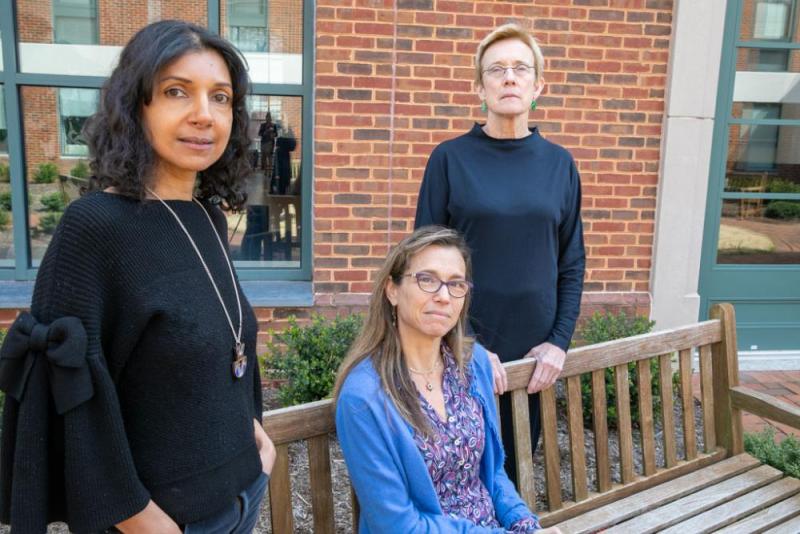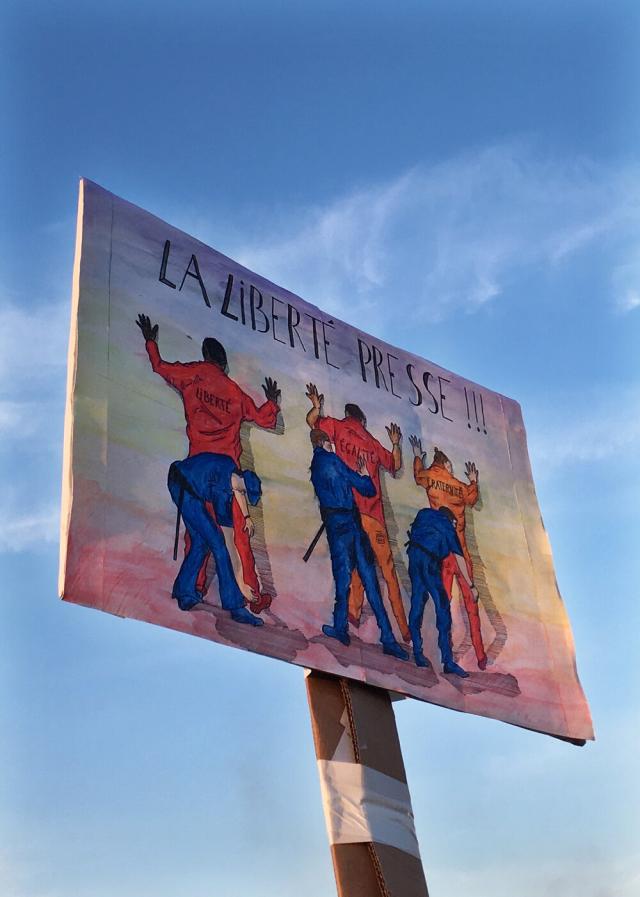New Democracy Initiative Lab Explores Creative Advocacy

On April 20, 2021, Minneapolis police officer Derek Chauvin was convicted of murdering George Floyd. It was the first time in the history of the state that a white officer had been convicted for killing a Black man while on duty, but the outcome of the trial could have been very different if only the stories of Chauvin and his fellow officers had been considered by the court and if it weren’t for the compelling evidence a young bystander captured on her cellphone.
To the extent that litigants in a courtroom rely on film, imagery and stories to discover the truth, the law is more art than science, and to give scholars the opportunity to explore the impact that visual and narrative storytelling has on the legal system and ordinary citizens’ demands for justice, the University of Virginia’s Democracy Initiative recently announced the addition of the Sound Justice Lab to its program of rotating labs. Under the direction of Bonnie Gordon and Nomi Dave, professors in the College’s Department of Music and Anne Coughlin, Lewis F. Powell, Jr., Professor of Law at UVA, the lab will create opportunities for faculty and students from different disciplines to come together to explore what justice looks, sounds, and feels like for those inside and outside of formal legal processes and how those experiences can shape legal advocacy.
As a collective of students, researchers, lawyers, artists and community partners, participants in the Sound Justice Lab will work across the boundaries of their individual disciplines and institutions to examine the impact narrative storytelling and audio-visual media can play in advocating for underrepresented individuals and communities and in shaping claims for justice for those whose stories and voices are often excluded from legal or institutional proceedings.
“Healthy law and a functioning democracy depend on the inclusion of multiple, conflicting, distinct voices and narratives, and that democracy can only survive if it is fundamentally the story not of the few but of the many,” said Gordon, a professor of critical and comparative studies, faculty director of UVA’s Equity Center and founder of UVA’s Arts Mentors program.
"The meaning of the law emerges from stories,” Coughlin said. “And it’s important to look at the stories that law accepts or rejects. The police are entitled to stop dangerous people, but if we only hear the story from the perspective of the police officer, we've lost a whole array of accounts that could inform our justice system,” Coughlin added.
Many Perspectives, One Purpose
Initially launched in 2019, the Sound Justice Lab came together in response to research project that Dave, a professor in the Department of Music and a former human rights lawyer, has been conducting in West Africa. When a research collaborator in Guinea was sued for defamation while reporting on a sexual assault case, Dave began to explore ways that creative practice and media like film and radio could be used to advocate for her colleague. Working with Bremen Donovan, currently the lab’s postdoctoral associate, the two began writing a documentary film about the defamation case and the larger context of justice claims around it.
Dave’s and Donovan’s film project and research led to conversations with Gordon whose work with the Equity Center and the Arts Mentors programs involves bringing the expertise of the UVA faculty to bear on social inequity in the Charlottesville community. Gordon connected them to law professor Anne Coughlin, whose interests range from criminal law and criminal procedure to feminist jurisprudence and the intersection of the law and the humanities.
“There was a kind of organic process and electrical connections that were happening with people that were really compelled by this urgent set of questions around the limits of legal cases, what we can do as advocates and how we can understand justice claims that exceed formal cases themselves,” Dave said.
Dave’s colleague in Guinea ultimately lost her defamation suit, but the questions that it raised and the huge outpouring of public support that the case generated convinced Dave, Gordon and Coughlin of the importance of bringing together experts from radically different fields of study to explore ways to effect social change.

“We discovered that there are other people working on similar projects but with very different tools, and we wondered what it would look like if we brought these people together,” Coughlin said. “In some sense, we're all asking the same questions in our separate disciplines. What is social justice for women? What does equality mean? How do we alleviate the suffering of people who have been excluded from formal processes? How do we alleviate the suffering of our students who are outside of the mainstream at UVA? What role can creative practice play in advocacy? and so forth. And we discovered, as we talked to each other, that we have different approaches to resolving those same questions and that the only way for a social justice movement to succeed is by this kind of rich collaboration."
Everyday Justice
In addition to incorporating research developed by the lab and its collaborators into their own curricula, Gordon, Dave and Coughlin envision the lab as being a resource for students across the whole UVA community – from Grounds in Charlottesville to campuses in the nation’s capitol and in the small town of Wise, Virginia – interested in learning more about the tools they need to achieve social justice outside of the courtroom, including writing effective op-ed pieces, how to use social media to influence public opinion and how to produce research-driven creative work.
Dave, Gordon and Coughlin also see opportunities for the lab to advance the cause of something socio-legal scholars call “everyday justice,” which involves the ways in which people seek justice, fairness, and equity beyond the courts and in everyday life.
In preparation for an event focused on Afghan women and storytelling, the lab helped a group of Charlottesville’s recent Afghan immigrants find much-needed shoes. The effort may not appear to have a connection to the lab’s mission, Gordon explained, but conversations with the women revealed that shoes were one of their most pressing needs. By listening to the women as partners, Gordon and Marjan Mohebbi, a local immigrants’ advocate, recognized that they needed to be flexible in conceiving of justice as a holistic pursuit.
The lab has already hosted a number of other programs and events for students and the public, including workshops, film screenings and discussions and a symposium on early Black American music. Partnering with the Legal Aid Justice Center, they have organized sessions on law and poetry and are planning creative advocacy projects for Charlottesville residents trying to navigate legal or other disciplinary proceedings. Most recently, the lab hosted journalist and activist Molly Conger who spoke about her experiences live-tweeting the recent landmark trial, Sines v. Kessler, involving the organizers of the 2017 Unite the Right rally.
“Here we see, precisely, a case in which the intent of Integrity First for America who led the suit was to shape the larger social narrative,” Dave said. “One of the questions we’re very much interested in is how legal cases spill out into the court of public opinion and the law and society and how one influences the other.”
Dave added that Black Lives Matter also evolved as a social movement meant to influence the courts considering cases much like George Floyd’s.
“It's a movement that started in response to judicial failure and to institutional failure, the failures of police and the failures of the criminal justice system,” Dave said. “Citizens demand justice, and they oftentimes use very creative and noisy and disruptive means to demand it because they know it’s important to capture the public’s attention and to capture the public narrative, and here we see this response to these failures in which people are demanding justice not just through the criminal justice system, but beyond it.”
Scholars in the Service of Democracy
The Democracy Initiative, UVA’s center for cross-disciplinary research, teaching and public engagement brings together scholars, government leaders and other experts to advance the prospects of democracy around the world and to examine the challenges that face it, and the Sound Justice Lab joins the Initiative with a number of projects already underway as well as a growing network of partnerships with faculty, students and community partners. Gordon, Dave and Coughlin believe the support of the Democracy Initiative will create the visibility they need to expand their network on and off Grounds and will give them the opportunity to offer their community partners the promise of a sustained commitment, and they also feel that their work will advance the core mission of the Democracy Initiative.
“The Democracy Initiative is committed to understanding the core institutions that provide the foundation for a healthy democracy. To say the least, the legal system is one such institution,” said Coughlin. “Democracy, no less than our rule of law, will be accepted as sound only if its judgments emerge from robust negotiations among alternative accounts of lived experiences. Our practice-based collaborative will contribute directly to the University’s fundamental role in shaping the creative and improvisatory practices of democracy. Through this innovative project, we will help to position the Democracy Initiative as a leader in shaping new forms of pedagogy, scholarship and policy to resolve the impasses and secure the promises of democracy. ”
“We have a deep divide about whose stories count and whose voices should be heard, in the legal sphere and in our society as a whole,” said the Democracy Initiative’s director for academic affairs, Laurent Dubois. “True democracy depends on all voices being heard and being part of the conversation. The Sound Justice Lab seeks to address one of the important questions facing our nation today.”




